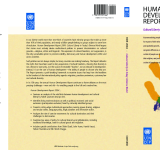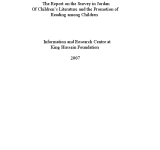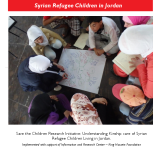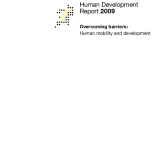Accommodating people's growing demands for their inclusion in society;; for respect of their ethnicity;; religion;; and language;; takes more than democracy and equitable growth. Also needed are multicultural policies that recognize differences;; champion diversity and promote cultural freedoms;; so that all people can choose to speak their language;; practice their religion;; and participate in shaping their culture—so that all people can choose to be who they are. In recent years the Human Development Report has argued strongly that this is as much a question of politics as economics—from protecting human rights to deepening democracy. Human development is first and foremost about allowing people to lead the kind of life they choose—and providing them with the tools and opportunities to make those choices. The 2004 Report builds on that analysis;; by carefully examining—and rejecting—claims that cultural differences necessarily lead to social;; economic and political conflict or that inherent cultural rights should supersede political and economic ones. Instead;; it provides a powerful argument for finding ways to “delight in our differences”;; as Archbishop Desmond Tutu has put it. It also offers some concrete ideas on what it means in practice to build and manage the politics of identity and culture in a manner consistent with the bedrock principles of human development.
internet
This report examines social development in Jordan with respect to childhood education and literacy. The survey presented examines the status of children’s literature and encouraging reading in Jordan. The report assesses the promotion of children’s literature in Jordan through various axes;; including the quality and prevalence of libraries;; the effectiveness of policies;; and the existence of civil institutions active in the field of children’s literature. The report also identifies various trends with respect to children’s literature through concentrated discussion groups with families;; teachers;; children;; and writers of children’s literature.
This report surveys children’s literature in the Arab Republic of Egypt and the promotion of child literacy. The survey examines the promotion of children’s literature through various axis;; including official state policies;; the role of the private sector;; and the role of institutions and national programs in promoting child literacy. The report also examines Egypt’s childhood education system;; the quality and distribution of public libraries throughout Egypt;; and the nature of the publishing industry. Finally;; this report makes a number of recommendations which aim to further promote literacy among children in Egypt.
This report concerns the results of a survey on children’s literature and the promotion of reading in Palestine as represented by the West Bank and the Gaze Sector. Emphasis is placed on a number of axes regarding children’s literature;; including policies and legislation;; programs and institutions;; libraries;; elementary schools and universities;; and the publishing and distribution of children’s books. Upon analysis of the state of children’s literature in Palestine;; this report identifies certain trends regarding child culture. It also identifies a number of problems facing the promotion of reading among children;; including financial constraints;; the quality and availability of libraries;; and the overarching challenges influenced by Israel occupation.
This report concerns the results of a survey on children’s literature and the promotion of reading in Syria. Emphasis is placed on a number of axes regarding children’s literature;; including policies and legislation;; programs and institutions;; libraries;; elementary schools and universities;; and general information regarding children’s books. Upon analysis of the state of children’s literature in Syria;; this report identifies certain trends regarding children's literature. It also identifies a number of problems facing the promotion of reading among children and makes a number of recommendations for the development and improvement of children’s literature.
his 2005 Human Development Report takes stock of human development;; including progress towards the MDGs. Looking beyond statistics;; it highlights the human costs of missed targets and broken promises. Extreme inequality between countries and within countries is identified as one of the main barriers to human development—and as a powerful brake on accelerated progress towards the MDGs. The report suggests that the world's governments are faced with a choice. They can start a decade for development with the financial resources;; technology and capacity to end poverty or we could have a human development failure. “Business as usual” will not allow fulfilling the promises and the commitments made in 2000. The cost of this failure will be measured in human lives;; increased inequalities;; violations of human rights and threats to peace.
Throughout history water has confronted humanity with some of its greatest challenges. Water is a source of life and a natural resource that sustains our environments and supports livelihoods – but it is also a source of risk and vulnerability. In the early 21st Century;; prospects for human development are threatened by a deepening global water crisis. Debunking the myth that the crisis is the result of scarcity;; this report argues poverty;; power and inequality are at the heart of the problem.The 2006 Human Development Report continues to frame debates on some of the most pressing challenges facing humanity.
Migration;; both within and beyond borders;; has become an increasingly prominent theme in domestic and international debates;; and is the topic of the 2009 Human Development Report (HDR09). The starting point is that the global distribution of capabilities is extraordinarily unequal;; and that this is a major driver for movement of people. Migration can expand their choices —in terms of incomes;; accessing services and participation;; for example— but the opportunities open to people vary from those who are best endowed to those with limited skills and assets. These underlying inequalities;; which can be compounded by policy distortions;; is a theme of the report. The report investigates migration in the context of demographic changes and trends in both growth and inequality. It also presents more detailed and nuanced individual;; family and village experiences;; and explores less visible movements typically pursued by disadvantaged groups such as short term and seasonal migration.








